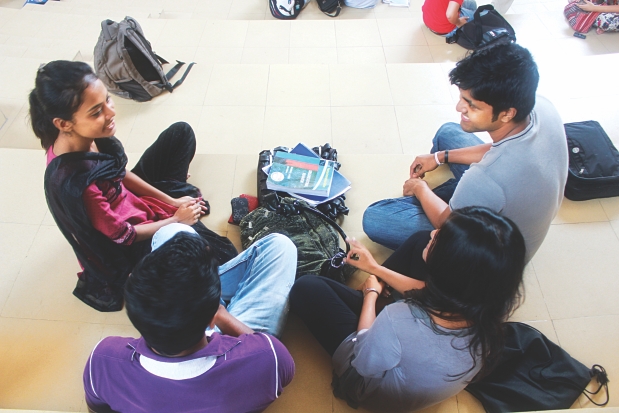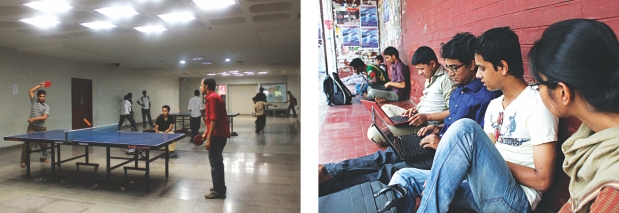| Home - Back Issues - The Team - Contact Us |
 Linking Young Minds Together |
| Volume 5 | Issue 30 | July 31, 2011 | |
|
Spotlight
The Young Fears Elita Karim "I go to dance class every Saturday and Tuesday after college. The classes are held near where I live and just takes me 6-7 minutes to walk over there or about 6 Takas if I take a cycle rickshaw,” says 22-year-old Samira Malik Rose, a student of Lalmatia Girl's College. An aspiring dancer, Rose is the only daughter amongst her two brothers and is the youngest in the family. A young woman with dreams in her eyes, Rose has been taking dance classes for three years. “I have always wanted to take classical dance classes but my parents never liked the idea of their daughter dancing on stage,” she says. “Plus, they also did not want my studies to be disturbed, which is why I got in this dance school right after my Higher Secondary exams. Of course, I had to do a lot to convince my parents to let me get in the school. One of the reasons why they allowed me to get in is because this particular school is near where we live and they can still keep track of my whereabouts. Maybe one day, I can get into a bigger school and study with well known names in this field.” And Rose goes on about her dreams, what she wants to do in the near future and where she wants to see herself in the next five years as a dancer.
Shakil Ahmed is a 17-year-old and actually wants to get into medical school to become a doctor! Studying in one of the English Medium schools in the capital, Shakil belongs to a generation of young people, who opt for the more unconventional career choices filmmaking, writing, even designing. In fact, he says that his parents are not at all a pressure factor regarding what he wants to do with his life. “I want to change the bad reputation that doctors 'enjoy' in this country, and rightly so,” he says. “I want to specialise in surgery, and become a brain surgeon.” Just like Rose and Shakil, there are probably thousands of ordinary young people out there in the country, with big dreams in their eyes, trying to survive the harsh race and see themselves right at the top. In fact, just like any other young person in the world, the young people in Bangladesh too have big dreams and want to live in a nation where the authorities, policy makers and mainly, the society will allow them to make these dreams turn into reality.
However, the recent occurrences in the country speak of a different story all together. In the last few months a 16-year-old boy, Limon, was shot by the Rapid Action Battalion (RAB) members, who were actually on the lookout for a criminal in the particular village. It was just by mere coincidence that Limon happened to be there with his herd of cattle when the officials shot him, thinking him to be the criminal. As per the news reports, the RAB officials did realise the mistake shortly after the 'mishap' had taken place. The outcome, however, was funny and rather confusing for the rest of the young people in the country, who were closely watching the Limon case on the TV news, not to mention online and in print. The authorities did all that they could to silence the outcry and the outrage that had poured from people all over the country and the world, and in fact, almost proved Limon to be a criminal, with weapons of all kinds and suddenly, in a dramatic way, produced all these 'evidences' to prove that he was somehow linked with dangerous gangs in the country. “The 'Limon Issue' warped up my brains completely!” says Shantantu Biswas, a third year student of Economics at a private university in Dhaka. Biswas, also a guitar player in a home-grown band that is yet to be named, is also very aware of his political rights and duties. In fact, he was one of the very enthusiastic first-time voters, who voted for the present government to rule back in 2009. “It was like watching a Royal Rumble (a wrestling match with two teams of wrestlers) on a TV channel,the law enforcers verses a mere child, the authorities trying to prove themselves innocent and getting all scared of a mere 16-year-old! Each day, I was discovering Limon's supposed life of crime in the papers and on TV. This just proves that anything can happen in this country, especially with young people and teenagers, who are poor and do not have the power or money to defend themselves.”
No proper survey was done or found which could determine the number of deaths of young people caused due to road accidents in the past few years in Bangladesh. However, news crawls in of young people being smashed to death by a truck or a bus or even for reckless driving almost every other day. It was, however, a jolt of pain and disbelief, when a group of students lost their lives in one of the most tragic road accidents to take place in the country. When more than 40 school children died in an accident in Mirasarai, Chittagong, it was a shock, not only to their fellow school mates, students all over the country and teachers, but also to parents. How in the world would they allow their children to do something as simple as watching a school football or a cricket match, let alone be in the school teams itself, without thinking about the major risks involved in letting them go for just a few hours road accidents, an airplane crashing on the site of the match, maybe a sudden local political war then and there and why ignore a sudden fire ignited by maybe a cigarette or CNG-run-vehicle? “My cousin had died last year while crossing the road in Dhanmondi,” says Samin Chowdhury, a copywriter at a local agency. “She was only 14 and was returning from her coaching classes. She was crossing the road to get a rickshaw, when a bus ran over her. She died on spot.”
Not only the young people, but also the older ones are advised to walk more. Not only is this good for one's health but also lets you get to one place from another quicker. “Easier said than done,” says Muhib Shams, 27-year-old Marketing Manager in a multinational company in Dhaka. “I work in Gulshan, but I live in Mirpur. It takes me more than two hours to reach work in the morning and then two more hours to reach home in the evening. Tell me, how and most importantly, where will I walk? There are no proper footpaths for walking, most of the foot-bridges are unsafe especially after dark and when it hits 6 pm, the whole city turns into a party zone for muggers and robbers. In fact, I was mugged twice on my way back home from work, while walking towards the bus stop. This city is becoming a little bit un-liveable every day.” The recent incident in Amin Bazaar, where six students were killed by an angry mob, was probably the last straw for many young people, especially parents. “Shab-e-Baraat is an important part of our culture in Bangladesh, where we all dwell with friends belonging to different religions and cultural backgrounds,” sayd Dr Yasin Tahmid Chowdhury, a father of two teenagers and a practicing doctor in Dhaka. “It has always been a sort of tradition for young people, especially the boys, to enjoy this event in the late evenings. We still don't know why the young boys had all ended up in Amin Bazaar, but this incident leads me think and believe that this society, moreover, the country, is not safe for our children anymore. There was a time, when I along with my friends would go from one home to another, trying to get a taste of the many sweetmeats and halwas made for Shab-e-Baraat and these adventures of ours would pour into the middle of the night as well. However, the recent tragedy has traumatised the nation, especially the parents of young children who will never be able to feel safe ever again.”
To make matters worse, the law enforcers in Amin Bazaar allegedly planted sharp weapons by the dead students, to prove to the world that they were actually robbers and not students, out looking for adventure outside their homes on the night of Shab-e-Baraat. In a nutshell, the young people in Bangladesh now have a new fear. Along with the fear of trying too hard to be global personalities to fit in with the rest of the world and people their age, the fear of being forced into early marriage, the fear of not being appreciated, the fear of being stuck for hours in a traffic jam, the fear of getting frustrated because of the age-old bureaucracies and political hindrances in the country, they now have the fear of walking down the street, going over to the next neighbourhood to enjoy a cricket match, to enjoy a play at the Shilpakala Academy or arrange a tour with friends at the Muktijoddha Museum. They now have fears of expressing themselves through music, drama or even in words. One cannot blame them anymore, if they decide to move abroad and live there for the rest of their lives. After all, nothing comes before protecting the lives of one's loved ones, not to mention, oneself.
Copyright (R) thedailystar.net 2011 |





